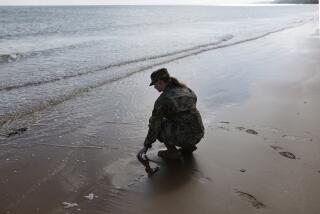BOOK REVIEW : Personal Accounts Provide Gritty Glimpses of World War II
- Share via
REMEMBERING WAR: A U.S.-SOVIET DIALOGUE by Helene Keyssar and Vladimir Pozner Oxford University Press $27.95, 254 pages
I will never forget the final triumphant scene of the performance by the Red Army Chorus at the Shrine Auditorium in Los Angeles last year.
As the curtain lifted, we saw a clutch of shadowy figures in uniform. But when the stage lights came up, we realized they were not wearing the garb of the contemporary Soviet armed forces. Rather, these handsome young men and women were decked out in the uniforms of World War II--some in Red Army uniforms, some in American uniforms. The scene, it turned out, was the encounter between the Soviet and American armies at the Elbe River in a newly defeated Nazi Germany--a moment in history when two mighty adversaries were allied in victory over fascism.
That emblematic moment is recalled in poignant detail in “Remembering War,” an annotated and illustrated oral history that offers the first-person recollections of Soviet and American men and women who served in World War II. Here are generals and admirals, foot soldiers and factory workers, pilots and POWs, each one sharing his or her own vivid glimpse of history with all the urgency and immediacy of one who was there.
The book was inspired by and drawn from, in part, a 1985 television program that brought Soviet and American veterans together to reminisce about their war experiences. But “Remembering War” is more substantial, and, at the same time, more nuanced than the medium of television allows. Here we have the gritty, sometimes heart-rending recollections of men and women who served in the war, but we also have a political and historical context in which to place their experiences.
“Forty years after the end of World War II, a substantial number of Americans have either forgotten or have never known that the United States and the Soviet Union were allies during the war,” writes Keyssar, a professor at U.C. San Diego, and Pozner, a Soviet media personality and something of a superstar of the glasnost era. “As these veterans of the battlefronts and home fronts of World War II tell their stories, events that have been forgotten take on new significance. The ‘Grand Alliance’ of World War II is not only momentarily renewed, but reencountered with a critical edge that allows both participants and readers a distinctive terrain on which to examine their understandings of themselves and each other.”
The authors are frank about the immense differences in the war experiences of the two peoples. American losses in World War II amounted to something more than 400,000, and--of course--the continental United States was never attacked. By contrast, the Soviet Union lost more than 20 million men, women and children, and the country was devasted by invasion, occupation and continuous fighting. To accommodate these differences in both experience and perception, each chapter consists of “A Soviet View” and “An American View,” and an attempt is made to pair up the recollections of Soviets and Americans. Still, the pairings only emphasize how much more the Soviet people suffered and sacrificed during World War II.
The book is not a comprehensive account of the war, nor does it pretend to be. I was troubled, however, by its curious silence on the Holocaust, much of which took place on Soviet soil or in places liberated by the Red Army. We are shown scenes of horror in the concentration camps and killing pits (“This is fascism,” the authors declare), but there are few references to the fact that these atrocities were directed toward the extermination of the Jewish people in the Soviet Union and throughout Europe.
What shines through the book are the firsthand accounts of the not-so-ordinary men and women who served in the war. Their words are the real grit and glory of “Remembering War.” We meet Zhenya, a woman who flew thousands of nighttime combat missions against the Nazis while still a teen-ager:
“The Germans called us ‘night witches,’ ” she recalls.
We see the linkup on the Elbe in gruesome detail:
“We went up to the river . . . and went across the bridge, where we saw the body of a little girl,” recalls an American GI named Ed. “We had to step over the little girl to get to the Russian soldiers. . . . I can practically see her today.”
And we meet Charlie, an American soldier who wept as he recalled his liberation from a POW camp by the Red Army:
“I can’t apologize for my tears,” he says in a passage that sums up what “Remembering War” is really all about. “Maybe if there were more of them . . . we wouldn’t be having the summits and so forth.”
More to Read
The biggest entertainment stories
Get our big stories about Hollywood, film, television, music, arts, culture and more right in your inbox as soon as they publish.
You may occasionally receive promotional content from the Los Angeles Times.










